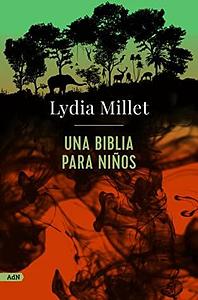Take a photo of a barcode or cover
A Children's Bible is a darkly comic apocalyptic coming-of-age biblical allegory about the climate crisis. That's an intriguing mix of genres, and Millet captures the spirit of our times well: characters salves the chaos with consumerism, younger generations scorn and resent the passivity of their elders, and wealthy white suburbanites are indignant that the police didn't show up to arrest the wannabe warlord who took their children hostage. It's everything going on right now, writ large.
That said, the allegory at the center of the story ultimately rang hollow to me. The narrator Eve's 9-year-old brother Jack is given a children's Bible and begins to notice similarities between the Bible stories and the characters' current situation. This leads him to develop a theory that the Trinity are symbols: God is nature, and Jesus is science, since he will only save you if you believe in him. (Late in the novel, Eve finishes this alternate trinity by suggesting that, though this idea gets barely any development.)
This is in-character for a bright 9-year-old who's had no religious education, but the novel itself never really develops Jack's childish analogy into anything more mature or nuanced - the final page hammers it home with zero subtlety. So we're left with the equivalent of the yard sign that probably stands in front of all these character's homes: "In this house we believe in science." But belief in science doesn't protect against the greed and inequality that led to the crisis in the first place, and it doesn't create the altruism or love or sense of meaning needed to survive it. (It's notable that Mattie, the who gives the kids ad hoc science lessons, gets a positive portrayal, while Darla, who tries to teach Jack and his friend Shel "humanities," is treated as a well-meaning but clueless hippie.) The novel is often clever, occasionally poignant, and finally very bleak, but it doesn't quite manage to be profound.
Also, a warning: If you're sensitive to torture scenes, there are a couple of nasty ones that occur while the kids are staying on the farm, though it's pretty obvious when they're about to happen if you want to skip ahead.
That said, the allegory at the center of the story ultimately rang hollow to me. The narrator Eve's 9-year-old brother Jack is given a children's Bible and begins to notice similarities between the Bible stories and the characters' current situation. This leads him to develop a theory that the Trinity are symbols: God is nature, and Jesus is science, since he will only save you if you believe in him. (Late in the novel, Eve finishes this alternate trinity by suggesting that
Spoiler
the Holy Spirit is artThis is in-character for a bright 9-year-old who's had no religious education, but the novel itself never really develops Jack's childish analogy into anything more mature or nuanced - the final page hammers it home with zero subtlety. So we're left with the equivalent of the yard sign that probably stands in front of all these character's homes: "In this house we believe in science." But belief in science doesn't protect against the greed and inequality that led to the crisis in the first place, and it doesn't create the altruism or love or sense of meaning needed to survive it. (It's notable that Mattie, the
Spoiler
Christ figureAlso, a warning: If you're sensitive to torture scenes, there are a couple of nasty ones that occur while the kids are staying on the farm, though it's pretty obvious when they're about to happen if you want to skip ahead.
sad
fast-paced
Loveable characters:
Yes
Diverse cast of characters:
No
Flaws of characters a main focus:
No
3.5 stars for a quick, entertaining read. Written well, but content was just not my fav.
dark
reflective
tense
medium-paced
Plot or Character Driven:
Plot
Strong character development:
Complicated
Loveable characters:
Complicated
Diverse cast of characters:
N/A
Flaws of characters a main focus:
Complicated
Perfect for the budding agnostic in your life. Teenage/young adult disillusionment with a dash of diet apocalypse.
good I guess but bleak af and not the right thing to read during a pandemic or while trying to parent and definitely not both
Sometimes clever, sometimes a bit cringe in the metaphors and dialogue. Overall a good, quick read that highlights generational differences and allows you to ponder how our own story may go.
adventurous
dark
mysterious
sad
tense
medium-paced
Plot or Character Driven:
A mix
Strong character development:
Yes
Loveable characters:
Complicated
Diverse cast of characters:
Yes
Flaws of characters a main focus:
Yes
What a weird yet fascinating novel. It started one way and went in a direction I didn’t expect, which was good but perhaps overdone. I can’t decide if it was excellent social commentary or too overt. I tend to think the latter. It bordered on satire, which I don’t think was the intent.



